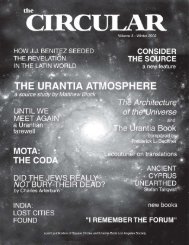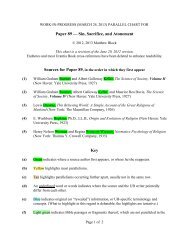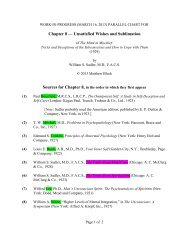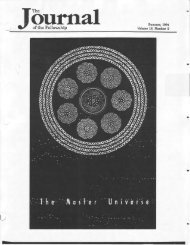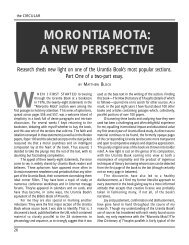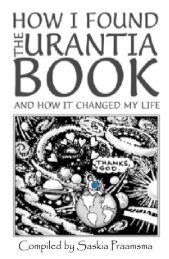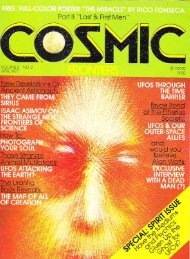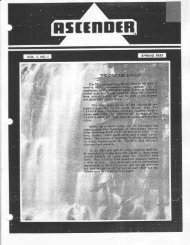18. Automatic Writing - Square Circles Publishing
18. Automatic Writing - Square Circles Publishing
18. Automatic Writing - Square Circles Publishing
You also want an ePaper? Increase the reach of your titles
YUMPU automatically turns print PDFs into web optimized ePapers that Google loves.
WORK-IN-PROGRESS (NOVEMBER 30, 2012) PARALLEL CHART FOR<br />
Chapter 18 — <strong>Automatic</strong> <strong>Writing</strong><br />
of The Mind at Mischief:<br />
Tricks and Deceptions of the Subconscious and How to Cope with Them<br />
(1929)<br />
by<br />
William S. Sadler, M.D., F.A.C.S.<br />
© 2012, 2013 Matthew Block<br />
Sources for Chapter 18, in the order in which they first appear<br />
(1) William S. Sadler, M.D., The Physiology of Faith and Fear: Or, The Mind in Health and<br />
Disease (Chicago: A. C. McClurg & Co., 1912)<br />
(2) William S. Sadler, M.D., F.A.C.S., The Truth About Spiritualism (Chicago: A. C.<br />
McClurg & Co., 1923)<br />
(3) Joseph McCabe, Is Spiritualism Based on Fraud?: The Evidence Given by Sir A. C.<br />
Doyle and Others Drastically Examined (London: Watts & Co., 1920)<br />
(4) Bernard Hart, M.D., The Psychology of Insanity (Cambridge: at the University Press,<br />
1912, 1916)<br />
(5) Morton Prince, M.D., LL.D., The Unconscious: The Fundamentals of Human Personality<br />
Normal and Abnormal (New York: The Macmillan Company, 1914 and 1921)<br />
Key<br />
(a)<br />
(b)<br />
(c)<br />
(d)<br />
Green indicates where a source author (other than Sadler) first appears, or where he/she<br />
reappears.<br />
Magenta indicates an earlier Sadler book.<br />
Yellow highlights most parallelisms.<br />
Tan highlights parallelisms not occurring on the same row, or parallelisms separated by<br />
yellowed parallelisms.<br />
Page 1 of 2
(e)<br />
(f)<br />
(g)<br />
(h)<br />
(i)<br />
An underlined word or words indicates where the source and Sadler pointedly differ from<br />
each other.<br />
Pink indicates passages where Sadler specifically shares his own experiences, opinions,<br />
advice, etc.<br />
Light blue indicates passages which strongly resemble something in the Urantia Book, or<br />
which allude to the Urantia phenomenon.<br />
Red indicates either: (1) an obvious error on Sadler’s part, brought about, in most cases,<br />
by miscopying or misinterpreting his source, or (2) Sadler’s use of an earlier text of his<br />
that contained time-bound information which he didn’t revise when presenting it in The<br />
Mind at Mischief, resulting in a historical impossibility, or (3) Sadler’s use of an earlier<br />
text of his which he revised in such a way as to contradict that earlier text.<br />
Gold highlights key words or themes which will be discussed in the analysis of the<br />
chapter.<br />
Matthew Block<br />
30 November 2012<br />
Page 2 of 2
SOURCE 18: THE MIND AT MISCHIEF<br />
Work-in-progress Version 1 July 2012<br />
© 2012, 2013 Matthew Block<br />
Revised 30 November 2012<br />
XVIII — AUTOMATIC<br />
WRITING<br />
XXXVIII: PSYCHIC FADS AND<br />
FAKES (The Physiology of Faith and Fear 457)<br />
AUTOMATIC WRITING AND TALKING (The<br />
Physiology of Faith and Fear 462)<br />
[contd] As close of kin to trances and<br />
so-called visions should be mentioned the<br />
practices of automatic writing and<br />
speaking.<br />
The study of multiple personality has shed<br />
much light on the psychology of automatic<br />
writing.<br />
When practising it the patient may appear<br />
to be in his usual state; in fact, he may be<br />
conversing with some one in a perfectly<br />
normal and natural manner, when, if a<br />
pencil is placed in his hand, he will begin to<br />
write continuously, writing long essays<br />
which are carefully composed, logically<br />
arranged, and sometimes extraordinarily<br />
fine in rhetorical expression; and all this is<br />
accomplished while the central<br />
consciousness is entirely ignorant and<br />
unconscious of everything that is going one<br />
(PF&F 462).<br />
18:0.1 AUTOMATIC writing and<br />
speaking are close of kin to so-called<br />
trances and visions.<br />
The study of multiple personality has<br />
shed much light on the psychology of<br />
automatic writing.<br />
When practising it, the patient may<br />
appear to be in his usual state; in fact, he<br />
may be conversing with someone in a<br />
perfectly natural manner, when, if a<br />
pencil is placed in his hand, he will begin<br />
to write continuously, writing long essays<br />
which are carefully composed, logically<br />
arranged, and sometimes extraordinarily<br />
fine in rhetorical expression; and all this<br />
is accomplished while the central<br />
consciousness is ignorant of everything<br />
that is going on.<br />
T E C H N I Q U E<br />
AUTOMATISM<br />
O F<br />
[contd] This automatic writing is in no<br />
essential different from the experiences of<br />
crystal-gazing, shell-hearing, and hypnosis.<br />
In automatic writing the activities of the<br />
marginal consciousness are projected<br />
outward along the motor line of writing.<br />
18:1.1 The conditions governing<br />
automatic writing are in no essential<br />
different from those of crystal-gazing,<br />
shell-hearing, and hypnosis.<br />
The activities of the marginal<br />
consciousness are projected outward<br />
along the motor line of writing.<br />
1
SOURCE 18: THE MIND AT MISCHIEF<br />
In this case the subconscious activities are<br />
not sensory; the primary cause rests neither<br />
in auditory nor visual sensation, as in shellhearing<br />
and crystal vision, but in sensations<br />
of touch and movement—they are entirely<br />
motor.<br />
The central consciousness does not<br />
become aware of what is going on in the<br />
marginal consciousness until it sees the<br />
thoughts expressed by means of the words<br />
automatically written.<br />
It will be apparent that to the central<br />
consciousness these messages would<br />
indeed appear as coming from another<br />
world; and so many a psychically<br />
unbalanced person, who has been exercised<br />
by automatic writing, has been led in this<br />
way verily to suppose that these written<br />
messages were from the dead, or from the<br />
spirits inhabiting other planets (PF&F<br />
462).<br />
[contd] The phenomenon of automatic<br />
speaking occurs in the same way.<br />
It is another case of a motor expression of<br />
psychic projection.<br />
This time the subject is concerned with<br />
spoken words, instead of written words.<br />
The speaking may take the form of<br />
meaningless syllables, which may sound like<br />
a new tongue, or the language may be<br />
entirely intelligible and logical.<br />
In this case, the subconscious activities<br />
are not sensory; the primary cause rests<br />
neither in auditory nor in visual sensation,<br />
as in shell-hearing, and crystal vision, but<br />
i n sensations of touch and<br />
movement—they are entirely motor.<br />
The central consciousness does not<br />
become aware of what is going on in the<br />
marginal consciousness until it sees the<br />
words that have been automatically<br />
written.<br />
18:1.2 It will be apparent that to the<br />
central consciousness these messages<br />
would indeed appear as coming from<br />
another world; and thus many a<br />
psychically unbalanced person has been<br />
led to believe that these written messages<br />
were from the dead, or from spirits<br />
inhabiting other planets.<br />
18:1.3 The phenomenon of automatic<br />
speaking occurs in the same way.<br />
It is another case of motor expression of<br />
psychic projection.<br />
This time the subject is concerned with<br />
spoken words instead of written words.<br />
The speaking may take the form of<br />
meaningless syllables, which may sound<br />
like a new tongue, or the language may be<br />
entirely intelligible and logical.<br />
2
SOURCE 18: THE MIND AT MISCHIEF<br />
These cases, several of which the author<br />
had the opportunity of fully examining a<br />
few years ago, are illustrations of those<br />
peculiar and unusual automatic talking<br />
performances which come to be regarded<br />
as the miraculous gift of tongues; and every<br />
syllable of their jargon is reverently listened<br />
to by their followers, who regard these<br />
mysterious utterances with awe, as<br />
messages from another world (PF&F 462-<br />
63).<br />
These cases are illustrations of those<br />
peculiar and automatic talking<br />
performances which come to be regarded<br />
as the miraculous “gift of tongues”; and<br />
every syllable of their jargon is reverently<br />
listened to by their followers, who regard<br />
these mysterious utterances as messages<br />
from another world.<br />
18:1.4 It is not necessary, in our study<br />
of abnormal psychology, to settle whether<br />
or not all of these automatic writers and<br />
talkers are self-deceived souls, or whether<br />
their writing and speaking has its origin<br />
entirely in an overactive subconscious<br />
mind which is able to eliminate its<br />
complexes in this peculiar fashion.<br />
I am not at all disposed to pronounce all<br />
these cases frauds, or even instances of<br />
self-deception. It may be altogether<br />
possible that some of them are<br />
manifestations of genuine activity on the<br />
part of actual spiritual forces, but that is<br />
not a point for further discussion in this<br />
connection.* [*See Appendix.]<br />
The purpose of their recital here is<br />
primarily to call attention to the fact that,<br />
as they are commonly met with in our<br />
every-day life, their net result is to render<br />
those who tamper with them more and<br />
more susceptible to spiritualistic<br />
propaganda.<br />
3
SOURCE 18: THE MIND AT MISCHIEF<br />
V: THE PSYCHIC PHENOMENA OF<br />
SPIRITUALISM (The Truth About<br />
Spiritualism 121)<br />
13. AUTOMATIC WRITING (The Truth About<br />
Spiritualism 147)<br />
[contd] The automatic talkers and<br />
writers, those who “speak with tongues,”<br />
etc., constitute the most interesting group<br />
of individuals who live their queer lives out<br />
on the borderland between the normal and<br />
the abnormal in psychology.<br />
18:1.5 The automatic talkers and<br />
writers, those who “speak with tongues,”<br />
etc., constitute the most interesting group<br />
of individuals who live their queer lives<br />
out on the borderland between the normal<br />
and the abnormal in psychology.<br />
These individuals are very interesting to<br />
study, from the psychologic standpoint.<br />
I have recently been privileged to<br />
thoroughly examine and carefully study not<br />
less than half a dozen men and women<br />
who are supposed to have the “gift of<br />
tongues,” and who are prominently<br />
identified with numerous present-day<br />
religious movements that exhibit these gifts<br />
of the spirits as evidence of Heavenly<br />
authenticity (TTAS 147).<br />
I have recently been privileged to study<br />
not less than half a dozen men and<br />
women who are supposed to have the<br />
“gift of tongues,” and who are<br />
prominently identified with religious<br />
movements that exhibit these gifts of the<br />
spirit as evidence of heavenly<br />
authenticity.<br />
CLASSES OF AUTOMATIC<br />
WRITERS<br />
[contd] I have had some very interesting<br />
experiences in connection with the study of<br />
automatic writers.<br />
I remember one case which came under my<br />
observation some twenty years ago, and<br />
after giving this man a thorough course of<br />
instruction regarding the physiology and<br />
psychology of his strange performances, he<br />
gradually lost his power of automatic<br />
writing and for the past six or eight years<br />
has been wholly unable to indulge in this<br />
phenomenon.<br />
18:2.1 I have had some very interesting<br />
experiences in connection with the study<br />
of automatic writers.<br />
I remember one case which came under<br />
my observation many years ago; after this<br />
man had had a thorough course of<br />
instruction regarding the physiology and<br />
psychology of his strange performances,<br />
he gradually lost the power of automatic<br />
writing, and for the last six or eight years<br />
he has been wholly unable to indulge in<br />
this phenomenon.<br />
4
SOURCE 18: THE MIND AT MISCHIEF<br />
Years ago he was able to take a pencil in his<br />
hand, drop off into a sort of passive<br />
dream-state, when suddenly the pencil<br />
would start in to write messages, as he<br />
supposed, having their origin in the spirit<br />
world.<br />
In this connection let me record it as my<br />
opinion that automatic writing and the<br />
automatism manifested in the ouija board<br />
performance are very nearly, if not quite,<br />
one and the same thing.<br />
That is, I regard them as identical in their<br />
psychologic roots—in their psychic origin<br />
and direction (TTAS 147-48).<br />
[contd] I have found it exceedingly<br />
difficult to segregate the sincere and<br />
subconscious automatic writers from those<br />
performers whose writing is more or less<br />
controlled—those who are to a certain<br />
degree conscious fraudulent (TTAS 148).<br />
[contd] There seems to be an inherent<br />
tendency on the part of these psychic<br />
freaks and so-called “sensitives” to<br />
exaggerate their gifts and, childlike, magnify<br />
their performances.<br />
The mental attitude of the medium seems<br />
to be to try and outdo other “psychics,”<br />
and so there is ever present this sort of<br />
urge to the perpetration of fraud (TTAS<br />
148).<br />
[contd] Notwithstanding the frauds to<br />
be found among automatic writers, there is,<br />
nevertheless, a residue who are wholly<br />
sincere, honest men and women who<br />
believe they are “spirit controlled,” or that<br />
in some other way their automatic writings<br />
have a spiritual origin (TTAS 148).<br />
Years ago he was able to take a pencil in<br />
his hand, drop off into something<br />
approaching a passive dream-state, when<br />
suddenly the pencil would start to write<br />
messages, as he supposed, from the spirit<br />
world.<br />
In this connection let me record it as my<br />
opinion that automatic writing and the<br />
automatism manifested in the ouija-board<br />
performance are very nearly, if not quite,<br />
one and the same.<br />
That is, I regard them as identical in their<br />
psychologic roots—in their psychic origin<br />
and direction.<br />
18:2.2 I have found it exceedingly<br />
difficult to segregate the sincere and<br />
subconscious automatic writers from<br />
those who are to a certain degree<br />
consciously fraudulent.<br />
There seems to be an inherent tendency<br />
on the part of these psychic freaks and socalled<br />
“sensitives” to exaggerate their<br />
gifts and, childlike, magnify their<br />
performances.<br />
The mental attitude of the medium seems<br />
to be to try to outdo other “psychics,” and<br />
so there is ever present this urge to the<br />
perpetration of fraud.<br />
18:2.3 Notwithstanding the frauds to be<br />
found among automatic writers, there is,<br />
nevertheless, a residue who are wholly<br />
sincere; honest men and women who<br />
believe they are “spirit controlled,” or<br />
that in some other way their automatic<br />
writings have a spiritual origin.<br />
5
SOURCE 18: THE MIND AT MISCHIEF<br />
VIII: AUTOMATIC WRITING (McCabe<br />
129)<br />
Mr. G. B. Shaw’s mother was an<br />
automatic artist of that class.<br />
A high-minded medical man of my<br />
acquaintance was a medium of the same<br />
type (McC 134).<br />
It would appear that Mr. G. B. Shaw’s<br />
mother was an automatic writer.<br />
I have a very good friend, a professional<br />
man, who is an automatic writer,<br />
but who no longer considers that his<br />
messages are dictated by discarnate<br />
spirits.<br />
Flammarion never became a Spiritualist,<br />
but was quite a fluent automatic writer in<br />
his youth. Victorien Sardou, the great<br />
dramatist, belonged to the same circle,<br />
and was an automatic draughtsman (McC<br />
135).<br />
18:2.4 While Flammarion never<br />
became an out-and-out spiritualist, it is<br />
well known that he was a fluent automatic<br />
writer in his young days, as was also<br />
Sardou, the dramatist, who more largely<br />
indulged his gift along the line of<br />
automatic drafting.<br />
Flammarion, in reciting some of his own<br />
experiences, sheds an interesting sidelight<br />
on the performances of automatic writers<br />
when he explains how,<br />
Quite without a deliberate intention, he<br />
signed his automatic writing (on science)<br />
“Galileo” (McC 135).<br />
after he had written out a considerable<br />
thesis on science, he subconsciously<br />
signed it “Galileo.”<br />
6
SOURCE 18: THE MIND AT MISCHIEF<br />
A S T R A N G E C A S E O F<br />
AUTOMATIC TALKING<br />
18:3.1 As indicating that all our<br />
experiences are conserved in memory*<br />
and as a demonstration that anything in<br />
the memory—even in the unconscious—<br />
can be recalled and find expression in<br />
both thought and words, I would cite the<br />
case of a patient suffering from<br />
Jacksonian epilepsy, which I have<br />
reported elsewhere. This singular case is<br />
one of automatic talking.<br />
[Compare 23:6.4.]<br />
[*It is highly probable that time, say thirty or forty<br />
years, will serve actually to efface many of our less<br />
vividly registered memories. Many of our memory<br />
patterns are not necessarily of lifelong duration.]<br />
APPENDIX B: A CASE OF<br />
CHRONOLOGICAL MEMORY (The<br />
Physiology of Faith and Fear 518)<br />
[contd] At the time the following<br />
observations were made, the subject, Mr.<br />
C., was about thirty years of age.<br />
His general health was apparently good,<br />
and he had never passed through any<br />
severe illness.<br />
Four years before these observations Mr.<br />
C. had engaged in a scuffle with an armed<br />
man and was dealt a severe blow on the<br />
head with a gunstock.<br />
A short time after this accident he<br />
developed a typical case of Jacksonian<br />
epilepsy.<br />
18:3.2 At the time when this patient,<br />
Mr. C., was operated upon, he was about<br />
thirty years of age.<br />
His general health was good; he had<br />
never passed through any severe illness.<br />
Four years before coming under our<br />
observation, he had been engaged in a<br />
scuffle with an armed man, who dealt him<br />
a severe blow on the head with a gunstock.<br />
A short time after this accident he<br />
developed a typical case of Jacksonian<br />
epilepsy.<br />
7
SOURCE 18: THE MIND AT MISCHIEF<br />
Immediately after each attack the patient<br />
seemed to be in more or less of a dazed<br />
condition, during which time he would<br />
often engage in usual and extraordinary<br />
escapades, even to the extent of going out<br />
on the streets at night and holding up<br />
pedestrians at the point of a revolver.<br />
As time passed these attacks of postepileptic<br />
insanity grew more and more<br />
severe, and lasted for a longer period of<br />
time (PF&F 518).<br />
[contd] During these periods of mental<br />
aberration following his epileptic attacks,<br />
the patient would wander away from home,<br />
sometimes being absent from one to three<br />
days.<br />
It was during one of these periods, when<br />
he was aimlessly wandering about town,<br />
that he was picked up and brought to the<br />
institution, where the author was permitted<br />
to make the observations here recorded.<br />
Immediately after each epileptic attack he<br />
seemed to be in a dazed condition, during<br />
which he would often engage in<br />
extraordinary escapades, even to the<br />
extent of going out on the streets at night<br />
and holding up pedestrians at the point of<br />
a revolver.<br />
As time passed, these attacks of postepileptic<br />
insanity grew more and more<br />
severe, and would last for longer periods<br />
of time.<br />
18:3.3 During the periods of mental<br />
aberration following his seizures, the<br />
patient would wander away from home,<br />
sometimes being absent two or three<br />
days.<br />
It was during one of these wandering<br />
periods, in which he was only semiconscious<br />
of what he was doing, that he<br />
was picked up and brought to the<br />
institution where I was enabled to make<br />
the observations here recorded.<br />
The patient was at this time also under the<br />
observation of Dr. W. B. Holden (PF&F<br />
518).<br />
[contd] Shortly after being placed in his<br />
bed and under guard, the patient began to<br />
talk in an apparently rational and<br />
chronological manner.<br />
His eyes seldom moved, his stare was fixed<br />
and concentrated straight ahead.<br />
It was soon apparent that he was relating a<br />
section of his life-experience in<br />
chronological order, day by day and hour<br />
by hour.<br />
All went well<br />
18:3.4 Shortly after being placed in his<br />
bed, and under guard, the patient began to<br />
talk in an apparently rational and<br />
chronological manner.<br />
His eyes seldom moved, his gaze was<br />
fixed and concentrated straight ahead.<br />
It soon appeared that he was relating a<br />
section of his life-experience in<br />
chronological order, hour by hour and day<br />
by day.<br />
All went well,<br />
8
SOURCE 18: THE MIND AT MISCHIEF<br />
as he talked hour after hour (only<br />
requiring that his lips be moistened now<br />
and then),<br />
until he came down to the time in his life<br />
marked by the fight in which he was hit<br />
over the head with the gunstock,<br />
whereupon he was immediately seized with<br />
a paroxysm of convulsions of extraordinary<br />
strength and duration.<br />
It required four men to hold him in the bed<br />
at this time, or rather on the bed, for<br />
mattress and all were quickly precipitated to<br />
the floor (PF&F 518-19).<br />
Immediately after a paroxysm of<br />
convulsions, this patient would begin to<br />
talk in a moderate tone of<br />
voice—somewhat of a monotone—<br />
concerning his life experience, his general<br />
thoughts and acts.<br />
He would begin with some Monday<br />
morning, by stretching his arms as on<br />
awakening in bed.<br />
He spoke very distinctly when expressing<br />
his leading thoughts, while he would<br />
quickly slur over numerous unimportant<br />
matters.<br />
At one time when under observation, it<br />
required him only twenty minutes to pass<br />
through a day’s experience; and during this<br />
brief time he repeated aloud his chief<br />
thoughts and described or illustrated in<br />
abbreviated pantomime, his chief acts.<br />
He would sometimes move his hands<br />
during these narratives, but never<br />
undertook to leave the bed, lying quietly on<br />
his back and talking continuously.<br />
until he came to the time in his life<br />
marked by the fight in which he was hit<br />
over the head with the gun-stock;<br />
whereupon he was immediately seized<br />
with a paroxysm of convulsions of<br />
extraordinary severity and duration.<br />
It required four powerful men to hold him<br />
in bed at this time, or rather on the bed,<br />
for the mattress and springs were quickly<br />
precipitated to the floor.<br />
18:3.5 Immediately after one of these<br />
paroxysms, the patient would begin to<br />
talk in a moderate tone of voice,<br />
somewhat of a monotone, concerning his<br />
experiences, thoughts, and acts.<br />
He would begin with some Monday<br />
morning, stretching his arms as on<br />
awakening in bed.<br />
He would speak very distinctly when<br />
expressing his leading thoughts, while he<br />
would quickly slur over numerous<br />
unimportant matters.<br />
At one time, I remember, it required only<br />
about twenty minutes to pass through a<br />
day’s experience, and during this brief<br />
time he repeated aloud his chief thoughts,<br />
and described or illustrated in abbreviated<br />
pantomime his chief acts.<br />
He would sometimes move his hands<br />
during these narratives, but never<br />
undertook to leave the bed, lying quietly<br />
on his back and talking continuously.<br />
9
SOURCE 18: THE MIND AT MISCHIEF<br />
He would pass through a day’s experience<br />
in from ten minutes to half an hour,<br />
apparently grow sleepy, and with but a few<br />
seconds of silence, which corresponded to<br />
the night’s sleep, would awaken, yawn,<br />
stretch his arms upward, yawn again, and<br />
then would immediately begin the narration<br />
of another day’s thoughts and actions<br />
(PF&F 519).<br />
He would pass through a day’s<br />
experience in from ten minutes to half an<br />
hour, depending on how recent the events<br />
were; and upon completing the story of a<br />
day he would apparently grow sleepy, and<br />
after but a few seconds of silence, which<br />
seemed to correspond with the night’s<br />
sleep, would awaken, yawn, stretch his<br />
arms upward, yawn again, and then<br />
immediately begin the narration of the<br />
next day’s thoughts and actions.<br />
IS MEMORY INFALLIBLE?<br />
During one of his longer recitals he<br />
passed through three years and a half of his<br />
life, apparently relating all the leading<br />
thoughts and chief events.<br />
At another time he passed over a period of<br />
eleven days which were very thoroughly<br />
known to his attendants and observers, and<br />
his recital included every known<br />
conversation of this period, each of which<br />
was very fully, accurately, and<br />
chronologically repeated (PF&F 520).<br />
[contd] I remember of one day when he<br />
was about to describe an experience with<br />
me. I told this experience as best I could in<br />
advance of his narrative.<br />
18:4.1 During one of his longer<br />
recitals, lasting about thirty-six hours, he<br />
passed through three and a half years of<br />
his life, apparently relating all the leading<br />
thoughts and chief events.<br />
At another time he passed over a period<br />
of eleven days which were very<br />
thoroughly known to his attendants and<br />
observers, and his recital included every<br />
known conversation and experience of<br />
this period, each of which was very fully,<br />
accurately and chronologically repeated.<br />
18:4.2 I remember, on one of these<br />
occasions, when he was approaching a<br />
point where he would soon be due to<br />
describe an interview with me, I told this<br />
experience, as best I could, in advance of<br />
his narrative.<br />
10
SOURCE 18: THE MIND AT MISCHIEF<br />
In fifteen or twenty minutes he reached the<br />
experience I had just anticipated, and gave<br />
it just as accurately, filling in a number of<br />
details that had slipped my mind; but<br />
wherein the details of his story were<br />
different from those of mine, I was<br />
compelled to recognize that in each and<br />
every case he was right and I was wrong;<br />
and thus it was demonstrated that his<br />
memory in the trance state was far more<br />
reliable than my normal memory (PF&F<br />
520).<br />
In passing through an experience of<br />
this sort, ranging from a few hours to two<br />
days, he never slept, but talked incessantly.<br />
He would take no nourishment during this<br />
time, but would sit up in bed and drink<br />
from one to three glasses of water, his<br />
mouth becoming very dry.<br />
He would stop his talking only long enough<br />
to drink this water.<br />
The expression of his face was usually quite<br />
fixed, except on certain occasions, when his<br />
face would grow pale and an angry look<br />
would come across it;<br />
at other times his countenance would light<br />
up while he was describing some ridiculous<br />
experience or relating some humorous<br />
episode (PF&F 522).<br />
Careful inquiry showed that he<br />
possessed absolutely no memory of<br />
anything that had happened since the time<br />
of his seizure.<br />
In fifteen or twenty minutes he reached<br />
the experience I had anticipated, and gave<br />
it just as accurately, filling in a number of<br />
details that had slipped my mind; but<br />
wherein the details of his story were<br />
different from mine, I was compelled in<br />
each case to recognize that he was right<br />
and I was wrong; thus it was<br />
demonstrated that his memory in the<br />
trance state was far more reliable than my<br />
normal memory.<br />
18:4.3 In passing through an<br />
experience of this sort, ranging from two<br />
hours to almost two days, he never slept,<br />
but talked incessantly.<br />
He would take no nourishment during this<br />
time, but would sit up in bed and drink<br />
from one to three glasses of water, or<br />
allow his lips to be moistened from time<br />
to time.<br />
The drinking of water was all we ever<br />
discovered that would stop his talking.<br />
His expression was usually quite fixed,<br />
except on certain occasions when his face<br />
would grow pale and an angry look would<br />
come across it.<br />
At other times his countenance would<br />
light up somewhat while he was<br />
describing some ridiculous experience or<br />
relating some humorous episode.<br />
18:4.4 Careful inquiry (after one of the<br />
attacks) showed that he possessed<br />
absolutely no memory of anything that<br />
had happened since the time of his<br />
seizure.<br />
11
SOURCE 18: THE MIND AT MISCHIEF<br />
He could always recall that his mind was<br />
feeling “queerly,” as he described it, and<br />
that he was afraid he was going to have<br />
another “spell.”<br />
None of his various depredations (in one<br />
of these conversations he described<br />
holding up six men in one evening, and<br />
four strange purses were found on his<br />
person) could be recalled to his mind.<br />
He was blissfully ignorant of all he had<br />
done and everything he had said.<br />
He knew of these things only by quizzing<br />
his nurses (PF&F 522).<br />
He could always recall that his “mind was<br />
feeling queer” as he described it, and that<br />
he was afraid he was “going to have<br />
another spell.”<br />
None of his various depredations (in one<br />
of these monologues he described holding<br />
up six men, and four strange purses were<br />
found on his person) could be recalled to<br />
his mind.<br />
He seemed to be blissfully ignorant of all<br />
that he had done and all that he had said.<br />
He apparently knew of these things only<br />
by quizzing his attendants.<br />
18:4.5 Aside from the surgical aspects<br />
of this case,<br />
The observation and study of this case<br />
was enough thoroughly to satisfy the<br />
author with respect to a number of<br />
propositions in modern psychology. First,<br />
that the memory retains well-nigh<br />
everything which has passed through the<br />
state of consciousness;<br />
while the recollection or the power of<br />
recalling facts and experiences may be very<br />
imperfect and incomplete, all the incidents<br />
exist in the subconscious or marginal state,<br />
relatively perfect and complete.<br />
Second, that the mind possesses an<br />
inherent chronological sense; that its<br />
memories are grouped and stored in<br />
chronological order; that the marginal<br />
consciousness (subconscious mind) is in<br />
possession of all the memory-data of the<br />
mind and is able to recall and reproduce<br />
the same in logical and chronological order<br />
(PF&F 523).<br />
it demonstrated fully to my mind that<br />
human memory retains well-nigh<br />
everything which has passed through the<br />
state of consciousness.<br />
While the power of recalling facts or<br />
experiences may be incomplete, all the<br />
incidents—the neural patterns—exist in<br />
the so-called subconscious mind or<br />
marginal state, relatively perfect and<br />
complete.<br />
Further, it seems that this case<br />
demonstrates that the mind possesses an<br />
inherent chronological sense, that its<br />
memories are grouped and sorted in<br />
chronological order; that the marginal<br />
consciousness is in possession of all the<br />
memory data of the mind, and is able,<br />
under certain conditions, and within<br />
reasonable time limits, to recall and<br />
reproduce the same in logical order.<br />
12
SOURCE 18: THE MIND AT MISCHIEF<br />
[contd] Careful study of this case could<br />
not but impress the observer that the<br />
human brain-memory is somewhat<br />
analogous to a phonograph cylinder, while<br />
the mind performs in the capacity of that<br />
power which operates, utilizes, reproduces,<br />
and otherwise manipulates those things<br />
recorded on the brain through the sensory<br />
receiving apparatus of the body (PF&F<br />
523).<br />
18:4.6 Observation of this patient could<br />
not fail to impress one with the fact that<br />
the human brain-memory, in its behavior,<br />
is in many respects analogous to a<br />
phonograph record, while the mind<br />
performs in the capacity of that power<br />
which operates, utilizes, reproduces, and<br />
otherwise manipulates those things<br />
recorded on the brain through the sensory<br />
receiving apparatus of the body.<br />
This case of automatic talking also serves<br />
to throw considerable light on the<br />
problem of automatic writing.<br />
I L L U S T R A T I O N S<br />
AUTOMATISM<br />
O F<br />
VIII: AUTOMATIC WRITING (McCabe<br />
129)<br />
This is a broad characteristic of<br />
automatic writing since it began in the<br />
fifties of the nineteenth century. At its<br />
best it merely reflected the culture of the<br />
time, which was often wrong. Stainton<br />
Moses, for instance, wrote reams of<br />
edifying revelation.<br />
18:5.1 Among British spiritualists,<br />
perhaps the most famous of the automatic<br />
writers was the Rev. Stainton Moses.<br />
But a careful study of his writings<br />
pertaining to history and other subjects<br />
shows that he must have been<br />
reexpressing the data found in the<br />
storehouse of his own memory.<br />
That some of the data of his subconscious<br />
mind were unreliable is proved by the fact<br />
that<br />
But I find among his wonderful<br />
utterances about ancient history certain<br />
statements concerning the early Hindus<br />
and Persians which recent discoveries<br />
have completely falsified.<br />
many of his statements concerning<br />
ancient Oriental races have been shown<br />
by subsequent discoveries to be entirely<br />
false.<br />
13
SOURCE 18: THE MIND AT MISCHIEF<br />
A careful scrutiny of his statements<br />
shows what books he had been reading—<br />
He had been reading certain books which<br />
were just passable (though already a little<br />
out of date) fifty years ago. Among other<br />
things the spirits told him that Manu lived<br />
3,000 B.C., and that there was a high<br />
“Brahminical lore” long before that date!<br />
books that were a little out of date even in<br />
his day,<br />
and that have since been shown to be<br />
entirely untrue.<br />
18:5.2 Most automatic writers insist<br />
that they have not read books whose<br />
contents would account for what they<br />
write.<br />
So with Andrew Jackson Davis, the first<br />
of these marvellous bringers of wisdom<br />
from the spirit world. He had probably<br />
read R. Chambers’s Vestiges of Creation,<br />
and he gave out weird and wonderful<br />
revelations about evolution. In the<br />
beginning was a clam, which begot a<br />
tadpole, which begot a quadruped, and so<br />
on.<br />
Davis certainly lied hard when he used to<br />
deny that he had read the books to which<br />
his “revelations” were traced, but no one<br />
can deny his originality (McC 135-36).<br />
Andrew Jackson Davis, one of the early<br />
wizards of automatic writing, wrote much<br />
about evolution.<br />
He denied having read books on this<br />
subject,<br />
but examination of his writings shows so<br />
much in common with Chambers’s work<br />
that one can only believe he had at some<br />
time read the book.<br />
14
SOURCE 18: THE MIND AT MISCHIEF<br />
In this connection we must remember that<br />
it is entirely possible for a normal person<br />
to read a book or magazine article, and to<br />
have its subject matter stored away in the<br />
subconscious archives of the brain,<br />
wholly forgotten by the normal<br />
consciousness, and yet to bring it all to<br />
light by means of hypnosis, dreams, or<br />
automatic writing.<br />
[Note: Moses’ automatic writings were published<br />
during his lifetime. All but one of his twenty-four<br />
notebooks have been preserved by the London<br />
Spiritualist Alliance.]<br />
18:5.3 Of the many thousands of pages<br />
of automatic writing left by the Reverend<br />
Mr. Moses, much was published after his<br />
death by trustees to whom he left his<br />
manuscript.<br />
These records are interesting, but far from<br />
convincing as proofs of anything<br />
supernatural.<br />
So far as we are aware, no message has<br />
ever been received by automatic writing<br />
that could not plausibly be shown to have<br />
had a natural and normal origin from<br />
well-known material which could easily<br />
have found its place, through ordinary<br />
channels of reading and observation, in<br />
the subconscious centers of the mind.<br />
18:5.4 The study of automatic writings<br />
shows that they fall into two groups:<br />
18:5.5 1. Those which are but a<br />
restatement of ideas and facts which the<br />
automatic writer has psychically<br />
assimilated in perfectly normal fashion<br />
through reading, attendance upon<br />
lectures, and otherwise mingling with his<br />
fellow men.<br />
18:5.6 2. Those which are manifestly<br />
fraudulent on their face.<br />
15
SOURCE 18: THE MIND AT MISCHIEF<br />
VII: MESSAGES FROM THE SPIRIT-<br />
WORLD (McCabe 109)<br />
In 1911 an advertisement in the Times<br />
offered £1,000 to any medium who would<br />
merely give proof of possessing telepathic<br />
power,<br />
About ten years ago a London paper<br />
offered a thousand pounds to any medium<br />
who would give proof, before a<br />
competent tribunal, of possessing<br />
telepathic power<br />
or of giving supernatural messages by<br />
means of automatic writing, etc.<br />
and there was not a single offer.<br />
This year Mr. Joseph Rinn, a former<br />
member of the American Society for<br />
Psychical Research and a life-long<br />
inquirer, has deposited with that Society<br />
a sum of £1,000 for any evidence of<br />
communication with the dead under<br />
proper conditions. There again will be no<br />
application.<br />
Mediums prefer a simpler and more<br />
reverent audience, even if the fees be<br />
smaller (McC 128).<br />
[Note: The offer was made in late 1922.]<br />
No one has ever appeared to claim the<br />
reward.<br />
Likewise, I think Rinn’s offer of a<br />
thousand pounds, which he deposited<br />
with the American Society for Psychic<br />
Research, to be given for bona fide<br />
evidence of communication with the dead<br />
under proper conditions, has never been<br />
awarded.<br />
Most mediums prefer to work for smaller<br />
fees with a sympathetic audience.<br />
The five thousand dollar award of The<br />
Scientific American was not won by any<br />
of the mediums examined.<br />
IV: DISSOCIATION (Hart 38)<br />
<strong>Automatic</strong> writing has played a large<br />
part in the history of spiritualism, and has<br />
been attributed by supporters of that<br />
doctrine to the activity of some spiritual<br />
being who avails himself of the patient’s<br />
hand in order to manifest to the world his<br />
desires and opinions.<br />
18:5.7 Spiritualists ordinarily maintain<br />
that the hand of the automatic writer is<br />
controlled by spirit forces,<br />
16
SOURCE 18: THE MIND AT MISCHIEF<br />
and that therefore the writing has little or<br />
no connection with the mind of the<br />
writer—that it is supernatural in origin<br />
and represents a message dictated by<br />
spirits.<br />
There is no need, however, to resort to<br />
fantastic hypotheses of this type,<br />
and the explanation of the phenomenon is<br />
comparatively simple.<br />
A dissociation has taken place, though<br />
one far more complete than those hitherto<br />
described.<br />
The field of consciousness is divided into<br />
two distinct parts, one engaged in<br />
conversation, the other comprising the<br />
systems of ideas which are finding<br />
expression in the automatic writing (H<br />
44).<br />
But there is no need of a spirit hypothesis<br />
to explain automatic writing.<br />
The explanation of the phenomenon is<br />
comparatively simple.<br />
A dissociation has taken place—one far<br />
more complete than those of ordinary<br />
hysteria.<br />
The field of consciousness is divided into<br />
two distinct parts, one engaged in<br />
ordinary conversation, perhaps, while the<br />
other is dealing with those ideas and<br />
complexes which are concerned in<br />
automatic writing.<br />
FORGOTTEN EXPERIENCES<br />
II: CONSERVATION OF FORGOTTEN<br />
EXPERIENCES OF NORMAL,<br />
ARTIFICIAL, AND PATHOLOGICAL<br />
LIFE (Prince 15)<br />
I. Normal Life (Prince 15)<br />
Evidence from abstraction. (Prince 24)<br />
18:6.1 In discussing the technique of<br />
automatic writing, one authority (Morton<br />
Prince) says:<br />
17
SOURCE 18: THE MIND AT MISCHIEF<br />
I would here point out that the<br />
recovery of forgotten experiences by the<br />
method of abstraction differs in one<br />
respect from their recovery by automatic<br />
writing. In the former case the recalled<br />
experiences being brought back by<br />
associative memories enter in the<br />
associations and become true conscious<br />
recollections, like any other recollections,<br />
while in automatic writing the memories<br />
are reproduced in script without entering<br />
the personal consciousness at all and<br />
while the subject is still in ignorance.<br />
Often even after reading the script his<br />
memory still remains a blank.<br />
It is much as if one’s ideas had been<br />
preserved on a phonographic record and<br />
later reproduced without awakening a<br />
memory of their original occurrence (P<br />
27).<br />
18:6.2 The recalled experiences being<br />
brought back by associative memories enter<br />
into the associations and become true<br />
conscious recollections,<br />
while in automatic writing the memories are<br />
reproduced in script without entering the<br />
personal consciousness at all and while the<br />
subject is still in ignorance.<br />
Often even after reading the script his memory<br />
still remains a blank.<br />
It is much as tho one’s ideas had been<br />
preserved on a phonographic record and later<br />
reproduced without awakening a memory of<br />
their original occurrence.<br />
Evidence obtained by the method of<br />
automatic writing. (Prince 15)<br />
Mrs. Holland’s script records, as<br />
investigation seemed to show, the exact<br />
words expressing a personal sentiment<br />
contained in a letter written to her twenty<br />
years before and long forgotten.<br />
18:6.3 In the investigation of Mrs.<br />
Holland’s automatic writing there was<br />
found in one of her automatic scripts a<br />
statement in the exact words—as well as<br />
reproducing the sentimental context—of<br />
a letter which she had written twenty<br />
years before.<br />
This experience she had long since<br />
forgotten,<br />
The letter proving this was accidentally<br />
discovered* (P 22).<br />
* In the automatic script, which purported to<br />
be a spiritistic message from a dead friend named<br />
Annette, occurred the enigmatical sentence:<br />
but the original letter was accidentally<br />
discovered.<br />
In the automatic script, which purported<br />
to be a spirit message from a dead friend<br />
named Annetta, there was found this<br />
sentence:<br />
18
SOURCE 18: THE MIND AT MISCHIEF<br />
“Tell her this comes from the friend who loved<br />
cradles and cradled things.”<br />
The meaning of this was revealed by the abovementioned<br />
letter to Mrs. Holland, written twenty<br />
years previously.<br />
It was from a friend of Annette’s, and quoted an<br />
extract from Annette’s will, which ran, “because I<br />
love cradles and cradled things.” When Mrs.<br />
Holland was tearing up some old letters she came<br />
across this one. (“On the automatic writing of Mrs.<br />
Holland,” by Miss Alice Johnson: Proceedings of<br />
the S. P. R., June, 1908, pp. 288, 289) (P 22).<br />
“Tell her this comes from the friend who<br />
loves cradles and cradled things.”<br />
Now, the meaning of this enigmatic<br />
sentence was revealed by the discovery of<br />
the aforementioned letter of twenty years<br />
and more before,<br />
for the letter quoted an extract from<br />
Annetta’s will, reading, “because I love<br />
cradles and cradled things.”<br />
Undoubtedly, if more old letters could be<br />
unearthed, or if we could walk at will in<br />
the halls of our early memories, we could<br />
discover the origin of much that appears<br />
in our daily conversation, and in many<br />
cases the automatic writers would be able<br />
to trace out their alleged spirit-dictated<br />
writings to a perfectly normal, natural,<br />
and human source, among the rich<br />
deposits of past experiences conserved in<br />
the unconscious realms of the mind.<br />
18:6.4 And so we must conclude that,<br />
in the case of both automatic writing and<br />
automatic talking, we now have a<br />
thoroughly scientific hypothesis which<br />
will account for all phenomena of this<br />
kind that deserve to be classified as<br />
genuine. Nothing as yet has ever come to<br />
us through automatic writing which bears<br />
any evidence of supernatural origin, or<br />
which contains authentic truths, facts, or<br />
principles heretofore unknown to the<br />
human race. The automatic writers have<br />
given us nothing but what is in every way<br />
consistent with our belief that such<br />
messages are only a rehash of the<br />
common elements of human experience<br />
stored away in the subconscious centers<br />
of the automatic writer’s own mind.<br />
19
SOURCE 18: THE MIND AT MISCHIEF<br />
18:6.5 The reader is referred to the<br />
Appendix for brief notice of a very<br />
unusual case of supposedly automatic<br />
writing associated with other psychic<br />
phenomena which came under my<br />
observation many years ago.<br />
20




